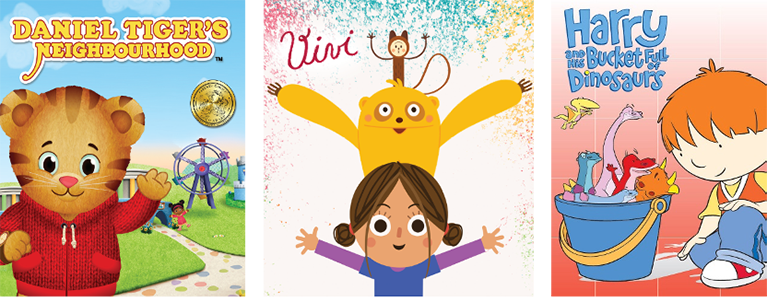Bringing “Daniel Tiger” to children in Central Asia

Educational TV shows are critical for keeping young minds active as the COVID-19 pandemic prevents children from learning in traditional classrooms. IREX has worked to bring English-language shows to the small screen—building children’s proficiency in English and promoting diplomatic ties between the U.S. and Central Asia.
The Central Asia Design Hub (CADH) project has facilitated this work. The project empowers TV stations to broadcast quality content in local languages; strengthens local production, dubbing, and subtitling companies; connects Central Asian TV outlets with their counterparts abroad; and promotes cultural diplomacy by bringing quality English-language shows to Central Asian audiences.
Through the project, which is funded by the U.S. Department of State, IREX has signed agreements with local media partners to bring English-language children’s shows to Uzbekistan, after recently signing similar agreements in Kyrgyzstan and Tajikistan.
High-quality educational shows for learning at home
As schools closed across Central Asia due to the pandemic, parents needed fun, interactive ways for their children to learn outside of the classroom.
To meet these demands, CADH supported the licensing costs for the educational cartoons Daniel Tiger’s Neighborhood, Vivi, and Harry and His Bucket Full of Dinosaurs. “We are very happy that the children of Uzbekistan will be able to enjoy these,” said U.S. Ambassador to Uzbekistan Daniel Rosenblum. The children’s programs will be available in English and dubbed into local languages.
The U.S. Embassy in Tashkent, Uzbekistan, highlighted the work. The Minister of Public Education of Uzbekistan, Sherzhod Shermatov, lauded the introduction of English-language programming in the country. It will be a great step to “[engage] children in an active learning process both in and outside of the classroom,” he said.
Strengthening partnerships and increasing access to licensed content
CADH’s recent agreements are a step toward making high-quality programming, regardless of the language it’s in, accessible to a wider audience around the world. Licensed English-language series are almost nonexistent on Central Asia’s airwaves. Licenses can be expensive. Central Asian broadcasters and English-language licensers often aren’t connected to each other.
Legislative and political barriers also prevent English-language shows from appearing on Central Asian TVs. Governments in Central Asia often have local-language content laws, which prescribe a minimum number of hours the stations must air content in the national language. In Kyrgyzstan, for example, the Law on State Language requires 50% of TV content to be broadcast in Kyrgyz.
Despite these challenges, U.S. Ambassador to Kyrgyzstan Donald Lu has emphasized the importance of introducing licensed programs in the region. Politicians on both sides view greater English-language and alternative programming as a win-win for cultural diplomatic ties and Central Asian governments’ push for children to engage with English.